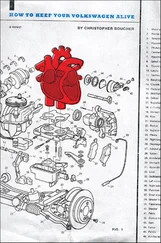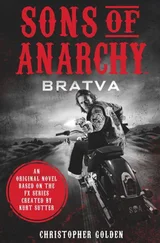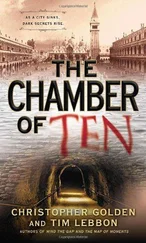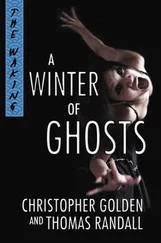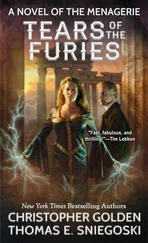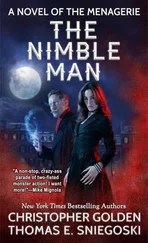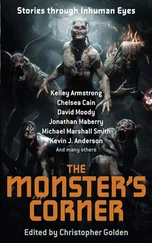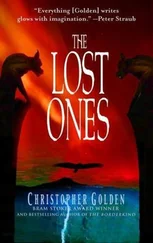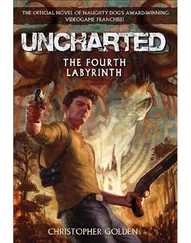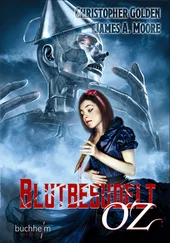“I wasn’t born in Appleseed,” I wrote.
With a steady time diet, shelter, and regular exercise, “I am.” grew and complicated. Soon he was “I am writing.” Then “I am writing words on the page.” Then, “I am writing words on the page about my own life.” And then, “I am going to transform my life through writing. I can do anything.”
Reader: “Transform?” That word is wild,  .
.
I can do anything on the page.
Not using those words, you can’t!
“Yes,” I wrote. “Yes, I can.”
For the first two months of the blight there was no word at all from the Mothers. You’d just see them overhead, in Reading Formation, scanning the page below. With more time on her hands, my Mom would sometimes drive around in the Fart, looking for a flock to follow. Once she saw some skirts in the sky on the way home from the Big When—“Look!” she said, “Look at them go!”—and she steered us down a side street in pursuit.
“I thought we were going to the When,” I whined.
“ Tsk ,” my Mom spat. “We’ll go where I say, when I say.”
My sister and I exchanged glances but neither of us said anything. We followed the pack of Mothers for almost half an hour, until they reached the southeast margin and swooped into a giant Nest. I think that was my first time actually seeing a Nest — which, I was surprised to see, really did look like a nest. Only this Nest? Was as big as a football field, and suspended about three hundred feet in the air, and made of twists of cement and dark steel. I could see glass windows in the gaps, and Mothers in goggles standing watch on some of the highest beams.
“Wow,” my mother said. “These woman are heroes. Heroes .”
“The-When-closes-in-an-hour,” the Auctioneer said. My Mom stared up at the Nest for another minute or two and then turned the Fart toward East Appleseed. “Heroes,” she said again.
Growing up with my Mom, I knew all about the Mothers — both the Appleseed chapter and the national movement, the Mothers of America. My Mom loved to tell us stories about the history of the brigade: the Mothers’ silent, ever-present support of the Suffragettes, the Anti-Slavery Conventions, the Woman’s Peace Party. Lucretia Mott was secretly a Mother, my Mom told us. So was Susan B. Anthony and Sojourner Truth. Abraham Lincoln. Ida B. Wells! Allen Ginsberg.
Reader: Abraham Lincoln?
Mothers don’t have to be women, nor do they have to have children. They just have to go through the training and take the oath; Mothers pledge to guard and protect a story, or change it when need be. Mothers can kick ass when they have to — they protected Allied planes during Word War II, for example, by deflecting machine-gun fire with their warskirts — but their real talent is revision. Did you know that the Mothers flew back to the pages of WWII after the conflict, for example, and reduced the casualties by thousands?
In those days the Mothers were more visible — you knew their names, and their meetings were open to the public. In the 1970s, though, the Mothers clandestined. The real wars, they realized, were hidden, happening on the everyday pages of the American suburbs: women suffering, in other words, in their very own homes. So that generation of Mothers changed their tactics. Instead of flying in a pack of thirty, they’d send out a school of four matriarchal vigilantes who’d hover overhead with state-of-the-apple surveillance devices. If they heard a catcall on a downtown Appleseed street, for example, or the sound of a man raising his voice to a woman, they’d swoop in. That’s what happened to Pauline Bramley and her husband Norman. Do you know that story?
Bramley and his wife lived on Derby Dingle. One night, Norman came home kaddished and he and his wife got in an argument. Norman, a rougher who’d already spent some time in Appleseed Prison, punched Pauline in the stomach. The Mothers were listening overhead and they heard Pauline cry out. They dropped through the clouds, tore the roof completely off the Bramleys’ house, picked Norman Bramley up by one arm and carried him to a Nest. When they returned him to his home three days later, he had a broken collarbone and nothing but nice things to say to his wife or anyone else. I mean that literally — the only words that he spoke for the rest of his life, over and over, were the words “nice,” “good,” and “fine.”
Word of that story and others like it hurdled through Appleseed. Soon it was clear who ran the book. Men did what they could —pretending to work, pretending to take care of their houses and cars, growing hair on their faces, baring their teeth — but Appleseed was steered by its women.
As the weeks passed without apples, though, people wondered where the Mothers stood, what they were doing to help. The Daily Core ran headline after headline: MOTHERS SILENT ON APPLE BLIGHT, one read. STILL NO WORD FROM THE MOTHERS, said another. And then, finally: WHERE THE &*!$ ARE THE MOTHERS?
At last, the Mothers accepted an invitation to attend a meeting of the Board of Select Cones. The Reader and I went with my Mom to Town Hall for the meeting. We arrived early to get good seats. When we walked in I saw three Mothers — two women and one man — seated at the front near a screen and a slide projector. The Mothers were dressed in standard combat issue: goggles, cardigan, warskirt.
Reader: Warskirt?
A Mother’s main resource. Warskirts are just like regular skirts, with a few modifications: they’re bulletproof, they have razor-sharp edges, and they hold knives, artillery, and a variety of small tools.
When everyone was seated, Cone Johnson coughed and leaned into his microphone. “I think we all know why we’re here,” he said. “Mothers? Would you like the floor?”
The Mother who stood up had gigantic muscles, and her face was painted with strange colors: stripes of orange, green, and pink. “Evening,” she said. “We’ve been looking at every angle of this apple shortage — going back into the past, forward into the future, lifting words off the page to look underneath them, trying to get a sense for what’s going on here.”
“Sitting on your asses is more like it,” mumbled a sweater behind me. The second Mother — taller, leaner — stood up and the sweater looked down at his shoes.
“We don’t think the problem is with the pages themselves. Our tests suggest strong fibers; the glue is holding; the spine is intact. The problem,” said the muscled Mother, “is that the pages of Appleseed itself are infested.”
The crowd began to murmur. “The pages?” said someone behind me.
“ Which pages?” someone else said. “This one?”
Cone Johnson leaned toward the microphone. “Infested with what?” he said.
One of my thoughts coughed.
The male Mother stood up and turned on the slide projector. An image of a worm appeared on the white screen.
“What you see there probably looks like your standard garden-variety pest,” said the muscled Mother, and the male Mother took a stack of brochures off the table and started handing them around. “But these guys are different,” the muscled Mother said. “ These worms — we call them ‘bookworms’—are thoughts. In the form of sentences.”
“So it’s not a worm, then,” asked Select Cone Miles.
“Technically? It’s a literaficidae ,” said the tall Mother.
“Pardon?”
“It has a printed body. They burrow and hide just like any other worm.”
I took a brochure— What’s So Bad About a Bookworm? — and passed the stack on.
Читать дальше
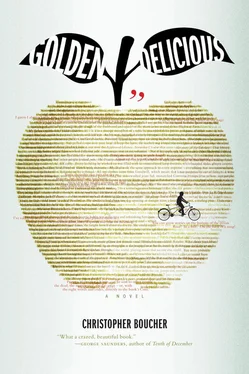
 .
.
